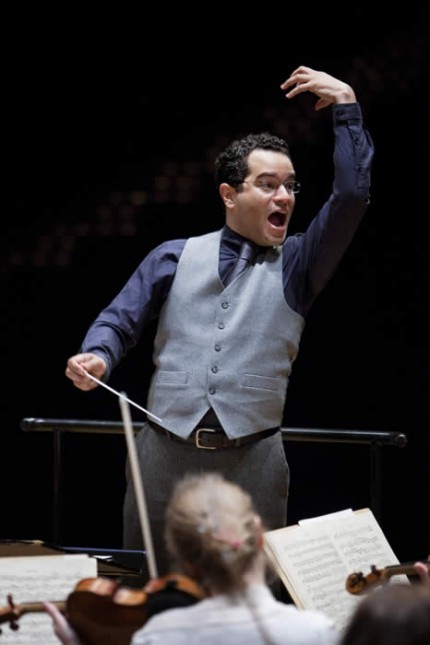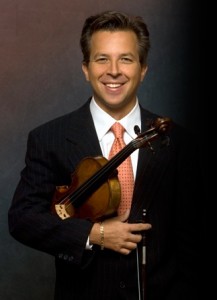Elgin Symphony makes fine showing with its gifted new conductor

The first work on the Elgin Symphony Orchestra’s program proved prophetic, at least in part–Hamish MacCunn’s Land of the Mountain and the Flood. There are no mountains but there was plenty of flooding in Chicagoland Friday night as the leap from subzero temperatures to the high 30s brought heavy relentless rain that made driving to the orchestra’s concert in Schaumburg a nerve-wracking experience.
Fortunately, the performances proved worth the trip. Currently in his first season as music director of the far northwest suburban ensemble, Andrew Grams showed himself a superb conductor Friday night, building on the favorable impression he made in his 2011 Grant Park Orchestra debut.
A former assistant conductor with the Cleveland Orchestra, Grams, 36, is a charismatic podium figure, leading with a clear and precise yet flexible beat. The young maestro drew consistently vital and polished playing with a wide degree of tonal coloring and finely graded dynamics in this offbeat Scottish program.
The majority of suburban orchestras tend to hover in the middling range of quality. Robert Hanson built the Elgin Symphony into an impressive ensemble over his nearly four decades of leadership and Hanson’s legacy remains. Winds and brass are more consistent than in most regional orchestras and the Elgin strings are especially fine, responsive and with rich gleaming tone beyond their numbers as led by the ESO’s excellent concertmaster Isabella Lippi.
One had to make allowances for the venue for this Elgin Symphony runout to neighboring Schaumburg. The Schaumburg Prairie Center for the Arts is a claustrophobic school assembly hall with a cramped stage, narrow brick walls and bone-dry acoustic. Even in this sonically inhospitable space, the Elgin Symphony musicians made a fine showing and will likely be heard to better advantage at their Hemmens Cultural Center home for the weekend repeats.
It was heartening to see a genuine Scottish composer represented on this program. Hamish MacCunn (1868-1916) was well regarded in his day in the UK and his Land of the Mountain and the Flood is an engaging and attractive work. Written at age 19, this ten-minute overture/tone poem is scored with great flair, blending a pentatonic Scottish “snap” with a lyrical second subject in the Late Romantic tradition. Grams and the Elgin players provided lively and worthy advocacy.
A violin concerto in all but name, Max Bruch’s Scottish Fantasy draws even more directly upon folk material for its themes but Bruch’s harmonic ingenuity and masterful scoring make this oddly neglected work into something greater than the sum of its folksong-inspired parts.
Michael Ludwig proved a simpatico soloist for Bruch’s warmly moulded melodies. Though the violinist is not a power player, he handled the Fantasy’s challenges and fitful fireworks capably if a bit dexterously, one jarring lapse apart.
Ludwig was fully in synch however with the nostalgic lyricism that is the essence of the Fantasy, playing with a refined sweet tone and bringing great tenderness to the lovely Andante. Too bad this performance retained the old and awkward cuts in the second and final movements.
Grams provided sterling accompaniment for Ludwig with an atmospheric introduction, warm string tone and deftly calibrated balances, aided by splitting the violins left and right. The performance was aided by a terrific rendering of the prominent harp part by Lillian Lau (uncredited in the program), with colorful playing that brought out the bardic qualities.
Mendelssohn’s Scottish Symphony (No. 3) closed the evening. Here too Grams impressed, eliciting a notably evocative introduction and fizzing allegro in the opening movement. Again, tempos were ideally judged and the performance flowed with firm momentum, Grams ensuring notably refined playing in the quiet codas. Perhaps in the Adagio and the final movement one wanted more corporate weight and sumptuous tone, with the horn theme of the finale needing stronger impact.
Still, this was an impressive showing by an important regional ensemble. With its gifted and energetic new conductor at the helm, the Elgin Symphony Orchestra seems poised for a bright future.
The program will be repeated 7:30 p.m. Saturday and 2:30 p.m. Sunday at Hemmens Cultural Center in Elgin. elginsymphony.org
Posted in Uncategorized



